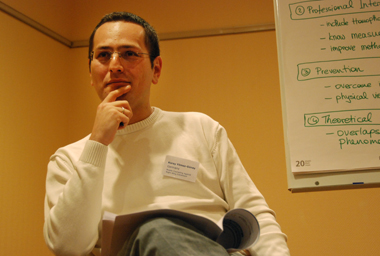Koray Yilmaz-Günay (34) looks very serene, a little tried maybe today as he drove all night from his hometown Berlin to facilitate a workshop in Vienna. “Working against homo- and transphobia without giving in to racist stereotypes”, that is the topic he will deal with today. He is a representative of the German association for Gays and Lesbians from Turkey (GLADT). As a man with Turkish roots – in spite of the clear colour of his skin – he knows the problem of mistrust toward immigrants in Germany, as a homosexual he knows another one.
“What about discrimination in other European countries?” That is the first question Yilmaz-Günay has in store for the participants of his workshop. In the UK the immigrants are Indian, in Poland they are Chechen refugees, racism could concern Roma in FYR Macedonia, whereas Polish racists would focus on Jews. Gay people are totally invisible in the public scene in Lithuania, whereas a gay could be a potential star in the Netherlands… In France the banalization of sexism is nothing special, whereas there is a consensus to fight racism. All participants shared their experiences about racism, sexism, homophobia and transphobia to identify the issues that Europe faces today.
The next day, Yilmaz-Günay leads a second workshop, where we find the same interested participants as yesterday and some new faces too. This time the topic is arguing against xenophobia. The participants use the method of forum theatre, simulating situations where they are confronted with xenophobic behaviour, to develop strategies on how to deal with this type of incidents. What do you when a black child is aggressed in the subway? And why doesn’t anyone intervene? The question could be: what do we do? Draw the attention to interrupt violence, change the atmosphere or address people directly? By experiencing these simulated incidents, the participants became aware of the difficulties that come with these situations.
After the workshop I meet Yilmaz-Günay in the hotel lounge, smoking a cigarette, and he addresses me with some nice French words. Discrimination is a paradoxical topic in Germany, he says. According to him, it is almost easier to find a job as a Turkish homosexual than just as a gay or just as a Turk: “People consider a Turkish homosexual as a victim, which is stupid.”

Whereas a Turkish man would be excluded because he is supposed to be a thief, and a gay because of his supposed manners, the Turkish homosexual has a place in society, as a victim he has a sympathetic role. “What a pity he is gay and an immigrant, we have to give him the job, people think”, says Yilmaz-Günay. Another paradox he points out is that German gay people tend to accept other forms of discrimination and banalize sexism and racism. The German gay scene turns right. “The main thing is gay’s emancipation”, he deplores. It is perhaps the price they pay, exclude to be included.
If he thinks there is a ground to stigmatize Turkish immigrants as homophobic and sexist? “Of course not. The problem isn’t cultural but social. My parents for example had a good way of life. When I told my mother: Mum I’m gay, she just asked me: are you happy? I answered yes, and she didn’t need to know anything else.” What concerns sexism, Yilmaz-Günay tells me about his Germanic studies: “The students were almost only girls, but all the teachers were men. In Turkey you find women on all levels of public life. In German that isn’t the case, even if a woman is leading the country.”
Posted in 2008-11: DARE conference| 20.11.2008
By: Claire Gandanger



